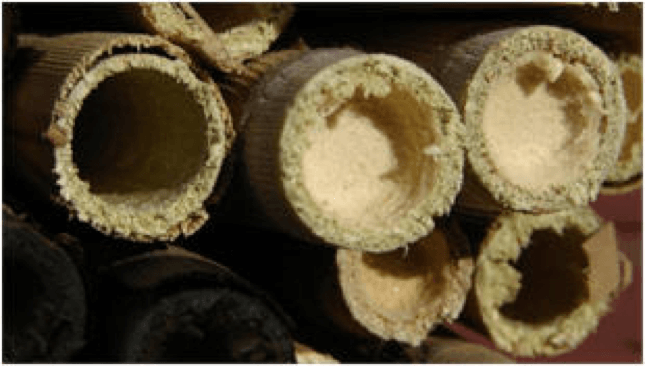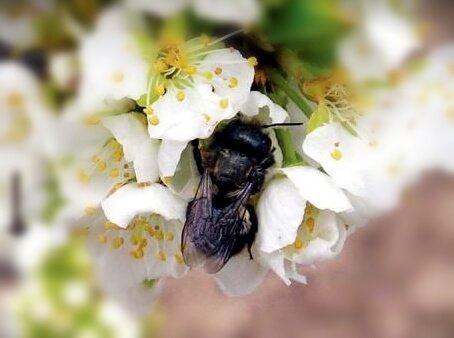
Mason bees lay eggs in stems or tubes, then pack them with mud. Evan Sugden photo.
You’ve probably heard about mason bees, the small, peaceful bees that are great pollinators. These non-aggressive bees are safe to have around kids and pets. They don’t live in a hive but are solitary bees.
You can buy or rent mason bee houses to pollinate your own garden. It’s best to use local sources. Crown Bees sells bees and houses. You may also find them at local nurseries.
If you’d like to try renting bees, Rent Mason Bees offers a 10% discount through Valentine’s Day. Rent bees for yourself and buy a gift certificate for a sweetheart or friend.
If you don’t know about mason bees, here’s how it works. You hang a mason bee house on a fence or wall. The bees hatch in spring and fly around your yard, pollinating fruit trees and early blooming spring plants.

Mason bee females can visit up to 2,000 flowers each day! Rent Mason Bees photo.
After laying their eggs, the bees die. The eggs hatch and become larvae and then fully formed bees in cocoons. Then they hibernate over the winter.
Renting bees has the advantage that you don’t need to worry about cleaning the blocks or cocoons to avoid problems with parasites or diseases. You return the bees in June after they have finished pollinating and laid their eggs. Rent Mason Bees takes care of sanitation and refrigerates the bees over the winter.
In the spring, Rent Mason Bees loads the bees (still in cocoons) on a truck and drives them to eastern Washington, Oregon, Idaho or California. They will hatch in commercial orchards and pollinate food such as apples, cherries, pears or almonds.
Many of the farmers that Rent Mason Bees works with are making changes to their practices to protect the mason bees. They are choosing alternative treatments rather than pesticides.
Crown Bees is working to build the market for mason bees with commercial growers. Both companies recognize the need to increase the supply of pollinators to support the food we eat. You can do your part by making a home for mason bees in your own garden.
Watch the video for more info
If you’d like to know more about mason bees, here is a short documentary.
